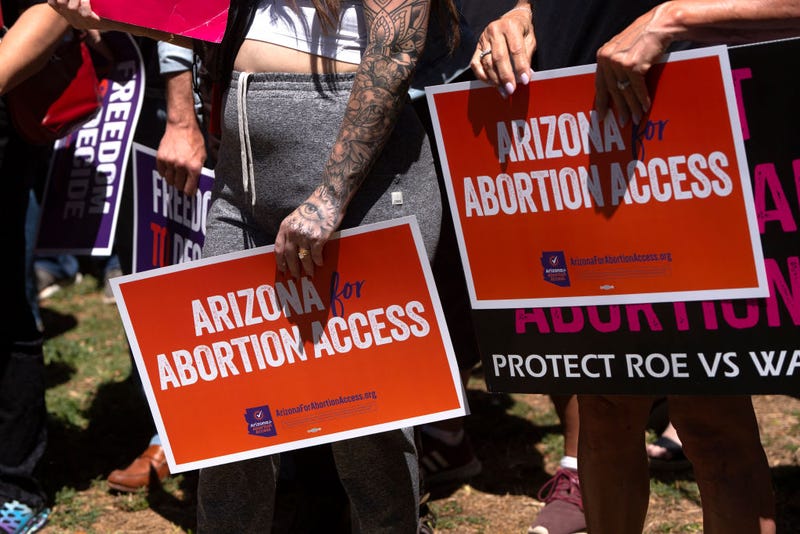
As the office of Arizona Attorney General Kris Mayes works to prevent an abortion ban penned in 1864 from going into effect, it is also warning residents that the ban could take effect as early as June 8.
That’s 45 days after the mandate is scheduled to issue on Wednesday.
“If you’re seeking reproductive healthcare and wondering what’s legal in Arizona, you’re not alone. The law can be confusing and change quickly,” said the attorney general’s office in an online information page.
Earlier this month, Audacy reported that Arizona Supreme Court justices issued a ruling that revived a Civil War-era law that put criminal constraints on abortion. If it does go into effect this summer, the law would supersede an existing 15-week abortion ban in the state. Neither the current law or the revived ban includes exceptions for rape and incest.
While there are already regulations on abortion care in Arizona, abortions – including medication abortions – are currently legal in the state under certain circumstances. Existing regulations on abortion in the state include “in-person notices,” to provide patients with certain information, required ultrasounds, a requirement that only licensed physicians perform abortions or provide medication for abortions, parental consent for minors and more.
Mayes said that abortion law is in flux due to ongoing court cases. Per current Arizona law, “abortion” refers to “the use of any means to terminate the clinically diagnosable pregnancy of a woman with knowledge that the termination by those means will cause, with reasonable likelihood, the death of the unborn child.”
It does not refer to contraceptive devices such as IUDs, oral contraceptives that prevent ovulation and emergency oral contraception that prevents implantation. It also doesn’t refer to procedures to terminate ectopic pregnancies (when fertilized eggs implant outside the uterus) or procedures to remove deceased fetuses or to manage miscarriages.
“At any point in the pregnancy, including after 15 weeks, abortion is legal if a doctor determines that there is a medical emergency,” Mayes office added.
Abortions are also outlawed in Arizona for certain reasons – including the sex or race of the fetus.
“The heart-wrenching decisions doctors and nurses will have to make if this 1864 law takes effect are unconscionable,” said Mayes of the potential ban. “Instead of listening to medical professionals alive today, Republicans in the Legislature would have Arizonans’ medical care dictated by men who lived 160 years ago at a time when women had few rights and Arizona wasn’t even a state. My office will continue to do everything we can to support our medical professionals as they work to provide care for their patients, which is already complicated under the current 15-week abortion ban. The bottom line is that these decisions should be private and made between a patient and their doctor.”
Apart from the potential centuries-old ban that could be revived in Arizona, abortion restrictions are subject to other litigation. These cases include two federal cases regarding the legality of mifepristone, a drug used for medication abortions, and a case regarding an Arizona law that makes it a crime for a doctor to knowingly perform an abortion that is sought solely because of a genetic abnormality of the fetus.
Democrat California Gov. Gavin Newsom said Sunday that his state would introduce emergency legislation to help provide abortion care for people from Arizona ahead of the potential ban.
In June 2022, the conservative-leaning U.S. Supreme Court overturned Roe v. Wade abortion protections that had been in place for decades. This move allowed states to put more restrictive laws into place.
According to a statement this month from Destiny Lopez, acting co-CEO of the Guttmacher Institute, more than one million abortions occurred within the formal U.S. health care system in 2023, despite restrictive abortion bans. She urged the Supreme Court to uphold emergency abortion care protections.
This Monday, President Joe Biden announced a new rule to strengthen privacy protections for reproductive health care.
“Access to reproductive health care is under attack following the Supreme Court’s decision to overturn Roe v. Wade,” said the president. “In addition to being forced to travel hundreds of miles for care or having their fertility services interrupted because of Republican officials’ extreme out-of-touch agenda, women and their families live in fear that their deeply personal medical information will be disclosed—simply because of the type of care they needed.”
Biden also said his administration will continue to work to make sure the protections previously included in Roe v. Wade become federal law.
